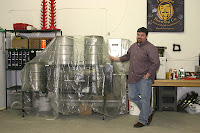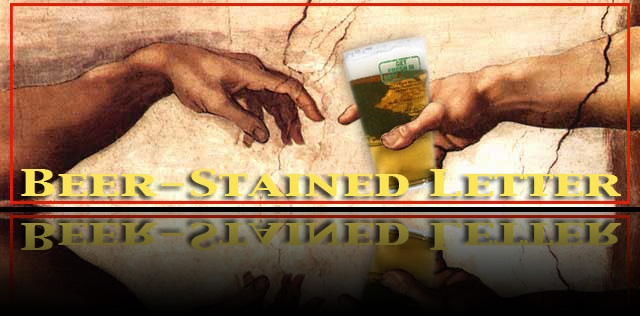New Jersey's craft beer brewers on Monday move closer to gaining some long-sought regulatory relief they contend is vital to growing the state's 17-year-old craft brewing industry.
After hearing an hour's worth of testimony, a state Senate panel voted to advance legislation championed by the Garden State Craft Brewers Guild that would ease restrictions on the industry, such as allowing brewpub owners to have more than two locations.
"Every beer made in New Jersey that's sold in New Jersey, those dollars stay here," Flying Fish owner and guild member Gene Muller told the Senate Law and Public Safety Committee.
The full Senate could act on the legislation as soon as March 15th. The Assembly version of the bill is still pending in committee. (On Monday afternoon, Assemblyman Louis Greenwald, a Camden County Democrat and Assembly majority leader, signed on as a sponsor. The Assembly version of the legislation was introduced by Craig Coughlin, a Middlesex County Democrat.)
"This is an important bill. It creates jobs. It creates investment opportunities. It signals that New Jersey is again the innovation capital of the region. It's the right thing to do to maintain our leadership position and outcompete our neighbors," said Senate sponsor Tom Kean Jr., a Union County Republican, whose district includes Trap Rock brewpub and Climax Brewing, a production brewery.
The guild issued a statement later in the day on its
Web site, noting the legislative process is far from over and renewed an appeal for support from beer drinkers.
"After a lot of give and take between the guild and representatives of the beer wholesalers, liquor stores, restaurant association and liquor distributors, an amended version of our legislation cleared the committee 5-0. One of the big reasons for the vote was that each committee member's office received more than 200 phone calls/emails from NJ consumers promoting the bill. We thank you for all your help," the message said.
The wholesaler and retailer groups used the committee hearing to rail against the legislation, and senators ultimately tossed a provision that would have allowed production breweries to sell beer through 10 off-premise retail salesrooms, a controversial freedom state wineries enjoy.
"The salesrooms came out. We heard from folks in the industry about their negative experience on the wine side. We decided to take those provisions out ... There's still enough in the bill that helps the industry expand and gives some of the privileges that neighboring states currently have that New Jersey doesn't have," the guild's lobbyist, Eric Orlando, said following the hearing.
Opponents also pushed for extending tax and monitoring rules that govern wine and liquor sold in New Jersey – namely a 24-hour warehouse hold on products – to apply to the proposed brewery regulation changes. Senators took that proposed amendment under advisement but did not act on it.
The wholesaler association likened the proposed salesrooms to so-called "tied houses" in which producers owned, or had a financial stake in, outlets where, by and large, only their beers were sold and served, thereby crowding out competition. They noted the three-tier system, the mercantile arrangement setup for alcoholic beverages after Prohibition, was designed to put a buffer between producers and retailers to prevent abuses that resulted from tied houses.
The tied house argument was also leveled at brewpubs, with the beer wholesaler association contending that the pubs' very existence resulted from a weakening of the three-tier system.
Allowing brewpubs' owners to have more that two licensed establishments – the bill calls for 10 – would further erode the system, opponents said.
"We have one brewpub that's a Pizzeria Uno in this state. Well, what's to prevent every Applebee's from deciding they want to become brewpubs?" Bob Pinard, executive director of the Beer Wholesalers Association of New Jersey, asked the Senate panel. "So I think we ought to walk before we run with the numbers on this thing ... Go to three, do it like some other legislation that has been proposed, have it (graduated). See what happens. In five years, maybe you can go up to some other number."
Other objections apparently insinuated that economic development was being used as a way to outflank the three-tier system.
"The federal government created an exception that said, 'You can, supplier of beer, you can retail only if, and only if, your retail establishment is immediately contiguous to your brewery.' So they made an exception, and we in New Jersey went along with that exception, and we allowed them to have two," Jeff Warsh, a lobbyist for alcoholic beverage wholesalers, told the senators. "Now we're saying they can have 10 under the umbrella of expanding businesses, allowing small businesses to expand. That's a fair policy determination on your part, but you should know at that time that this itty-bitty little exception that was supposed to create a couple of brewpubs is now going to create 10 brewpubs, times as many owners as there are. So that tied house tiny little exception is becoming a very big exception."
Committee member Sen. James Holzapfel, an Ocean County Republican whose district includes Artisan brewpub in Toms River, batted down the notion of brewpubs proliferating if the legislation were approved. Each brewpub would be expected to obtain a consumption license from its host town, an expensive proposition given the six- to seven-figure prices for the licenses.
While the brewers guild had no objections to dumping the retail salesroom request, it stood firm on brewpub expansion. Guild members noted the irony that Triumph Brewing, the Princeton brewpub that worked to bring craft brewing to New Jersey in the 1990s, has not expanded in New Jersey since then, but went on to open two new locations in Pennsylvania, where the regulatory climate is friendlier.
Guild members also defended the three-tier system, saying they cannot grow their businesses without partnering with distributors to reach markets. But they also pointed out flaws in the three-tiered system: Though it was instituted as a consumer protection aimed at curbing abuses by big brewers, guild members said, over the years it has created unintended problems with access to markets for small-batch brewers. Most states have allowed exceptions, so-called "carve-outs," to the system to promote industry growth.
"Once you take the (salesrooms) out of it, every single item in this bill is currently legalized in all of the border states of New Jersey. That's New York, that's Pennsylvania, that's Delaware," testified Iron Hill owner Mark Edelson.
Iron Hill, which has nine locations spread among Delaware, Pennsylvania and New Jersey, is planning a second South Jersey location. Under current law, that would max out the company's investment in the Garden State.
"We're not cutting new ground here," he continued. "What were trying to do is be competitive in this market and make New Jersey more competitive ... None of the carve-outs proposed here are new and not currently –
actively – being used to great effect in states, not only in the mid-Atlantic region, but across this country."
 A Pennsylvania craft brewery in development pays homage to a New Jersey beach town.
A Pennsylvania craft brewery in development pays homage to a New Jersey beach town. "I've been homebrewing for 15 years, and in the last two years, I decided to go with a business," Robert says. "I got a real push from family and friends, did some local events; people said they really loved the beers."
"I've been homebrewing for 15 years, and in the last two years, I decided to go with a business," Robert says. "I got a real push from family and friends, did some local events; people said they really loved the beers."























